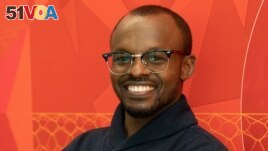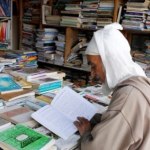27 November 2021
Purdue University chemistry professor Jianguo Mei is from China. He has been teaching students in the United States for over 10 years.
Mei knows it is important to communicate effectively with his students in English. Sometimes he has trouble today.
That, he said, is one reason why his old student Aristide Gumyusenge will be an excellent professor at the Massachusetts Institute of Technology, or MIT.

Aristide Gumyusenge will start as a professor in chemistry and organic materials at MIT in 2022.
Gumyusenge, who grew up in Rwanda, will start his career at MIT in January. He is only 30 years old.
Gumyusenge is an assistant professor of materials science and engineering. He recently finished advanced research at Stanford University in California.
If Gumyusenge does a good job over the first five years, he will have a chance to be a permanent professor at MIT.
In an interview with VOA, Gumyusenge said he is looking forward to opening the Organic Materials for Smart Electronics lab at MIT. He is currently looking at students for his research team.
Growing up in Rwanda, Gumyusenge understood the importance of education. His father was a teacher, after all, but he never thought about teaching.
"Even after high school, I still thought I was going to medical school," Gumyusenge told VOA.
He arrived in the U.S. in the autumn of 2011 after receiving a scholarship to Wofford College in South Carolina. He was part of the Rwanda Presidential Scholars Program.
Gumyusenge said it was not until he started his advanced degree work at Purdue University in Indiana that he thought about a career as a university professor.
He is planning to continue the work he did at Purdue and Stanford on engineering electronic devices. He said some of the things people see in movies set in the future, where people are wearing "smart suits and smart devices," are getting close to becoming real.
He gave an example of a contact lens that can measure the amount of sugar in the body.
"We're trying to make electronics that can be more compatible with the body, both mechanically and chemically."
Gumyusenge is working to create materials that can move electricity in the same way that metals in computers chips do now. He said the next thing is for engineers and chemists to work together so they can make products that work better with the body.
But research is only part of his job. He needs to work with students, and that is where Mei said Gumyusenge is strongest.
"Aristide's training in English probably helps him," Mei said, adding: "he handles the language much better than I do."
Mei pointed out that Gumyusenge had to work as a teaching assistant during his time at Purdue, both giving lessons and helping students in the laboratory. It can cause a lot of worry for teachers who do not speak English well.
"Undergrad students demand much more, actually, than grad students," Mei said, noting that his own difficulty with English is not as much of an issue in his work with Ph.D. students.
Gumyusenge speaks English very well. How did he learn?
Growing up in Rwanda, after his country's civil war ended, one of his favorite things to do was to listen to English-language broadcasts on the family's radio.
Whenever he had the chance, he listened to the VOA Learning English programming. Gumyusenge said he arrived in the United States as a teenager able to speak well and understand American English accents thanks to the programs.
He said the slower speed of the Learning English broadcasts helped him learn quickly compared to news and music programs in English.
"The actual learning program, the speed was adjusted so that people like myself can pick it up. You don't get that once you hit the ground here [in the U.S.]. Really thankful for the program and I really appreciate all the work that you all are doing."
In Rwanda, he was able to learn to read English, but it was hard to find people who could speak without an accent. The announcers for English-language programming in Rwanda had an accent. So, VOA, he said, helped him learn American accents.
Speaking English, he said, "can help you get a job." In addition, Gumyusenge said, a lot of science videos are in English, so students can learn quite a bit on their own by following them.
At Wofford, he found a way to talk with American students. One topic he learned so he could have a conversation? The Star Wars movies.
He understood it would be important for him to learn how to speak confidently with Americans. At first, he just listened and tried to speak the same way as his schoolmates.
"I guess I was lucky because I got here when I was 18 to 19. So, I still had some flexibility, I guess, in the brain, to allow myself to learn."
While Gumyusenge does not have a strong accent now, "you should have met me in 2011," he said.
What does he say to international students at American universities today? Do not hold on too tightly to your old life at home. Experience life in America while you have the chance.
"I know people who get here and change nothing about their daily routine," he said. "They live as if they're still living in Kigali or Lagos."
He continued:
"Be open. Allow for people to approach you. Don't close doors too early. America is such a diverse place, you're going to meet people from different backgrounds. And you never know who's going to have an impact on you."
I'm Dan Friedell.
Dan Friedell wrote this story for Learning English. Susan Shand was the editor.
What do you think about Aristide Gumyusenge's journey from Rwanda to MIT? What can you learn from him? Tell us in the Comments Section and visit 51VOA.COM.
Words in This Story
scholarship – n. an amount of money that is given by a school, an organization, etc., to a student to help pay for the student's education
contact lens – n. a thin piece of round plastic that is worn on the eye to improve vision
compatible – adj. able to exist together without trouble or conflict : going together well
adjust – v. to change (something) in a minor way so that it works better
accent – n. a way of pronouncing words that occurs among the people in a particular region or country
global – adj. involving the entire world
flexibility – n. capable of being changed
approach – v. to move or become near or nearer to something or someone
diverse – adj. made up of people or things that are different from each other
impact – n. a powerful or major influence or effect












